Applying Ethical Theories: Students & Sensors - CSU Analysis
VerifiedAdded on 2023/06/04
|8
|2156
|133
Essay
AI Summary
This essay delves into the ethical considerations surrounding the University of Arizona's data collection practices, specifically focusing on the use of student ID card swipes to track student movements. The analysis reveals a lack of awareness among students regarding the tracking capabilities of their ID cards and a subsequent decline in card usage over time. The essay applies four classical ethical theories—Utilitarianism, Deontology, Virtue Theory, and Contract Theory—to evaluate the ethical implications of this data collection. It discusses the potential benefits and drawbacks of each theory in the context of student privacy and institutional responsibility, considering aspects such as individual rights, overall happiness, moral duty, and contractual agreements. The conclusion emphasizes the importance of mutual understanding and respect for rules within a university environment, advocating for education and ethical reasoning to improve student behavior and decision-making.
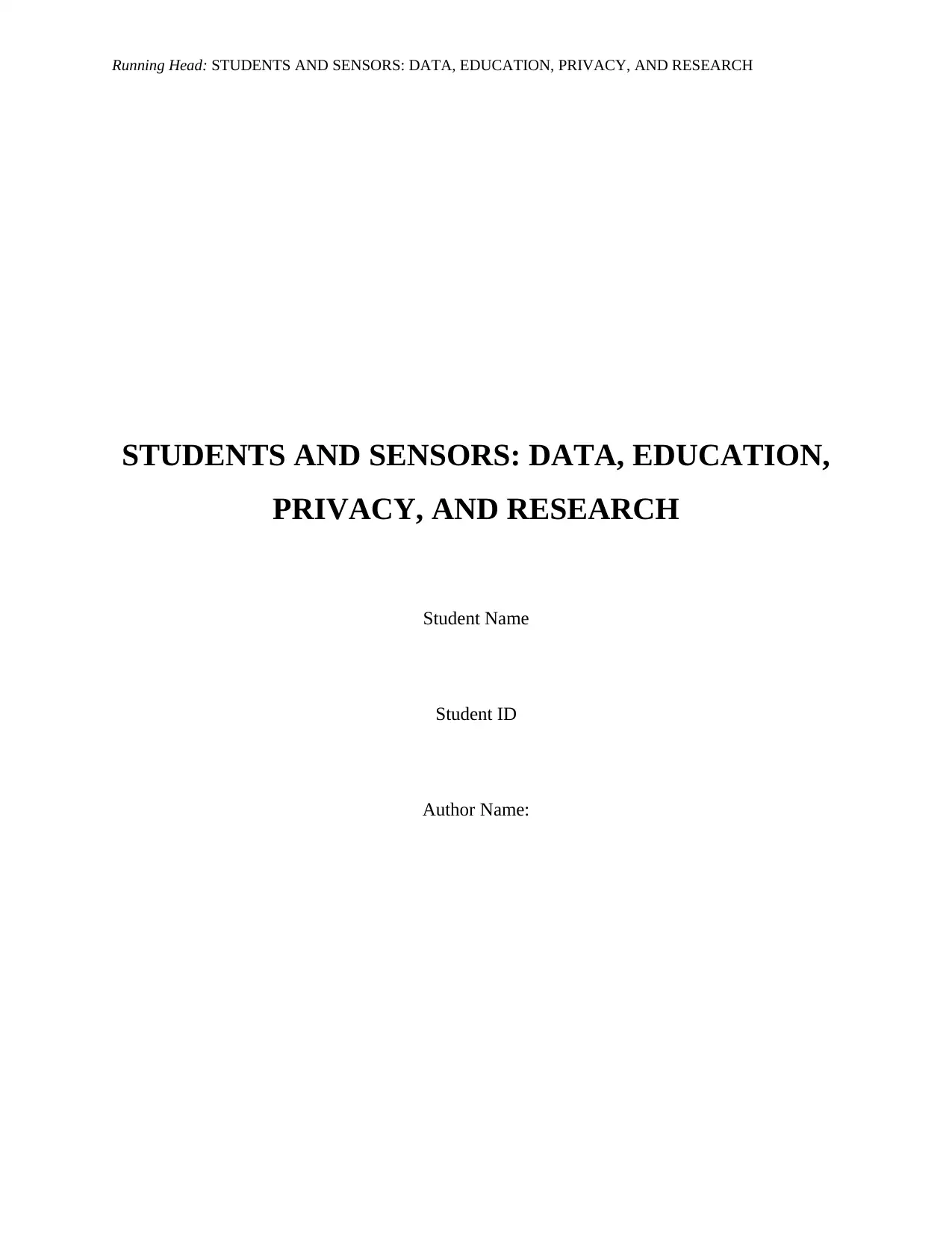
Running Head: STUDENTS AND SENSORS: DATA, EDUCATION, PRIVACY, AND RESEARCH
STUDENTS AND SENSORS: DATA, EDUCATION,
PRIVACY, AND RESEARCH
Student Name
Student ID
Author Name:
STUDENTS AND SENSORS: DATA, EDUCATION,
PRIVACY, AND RESEARCH
Student Name
Student ID
Author Name:
Paraphrase This Document
Need a fresh take? Get an instant paraphrase of this document with our AI Paraphraser
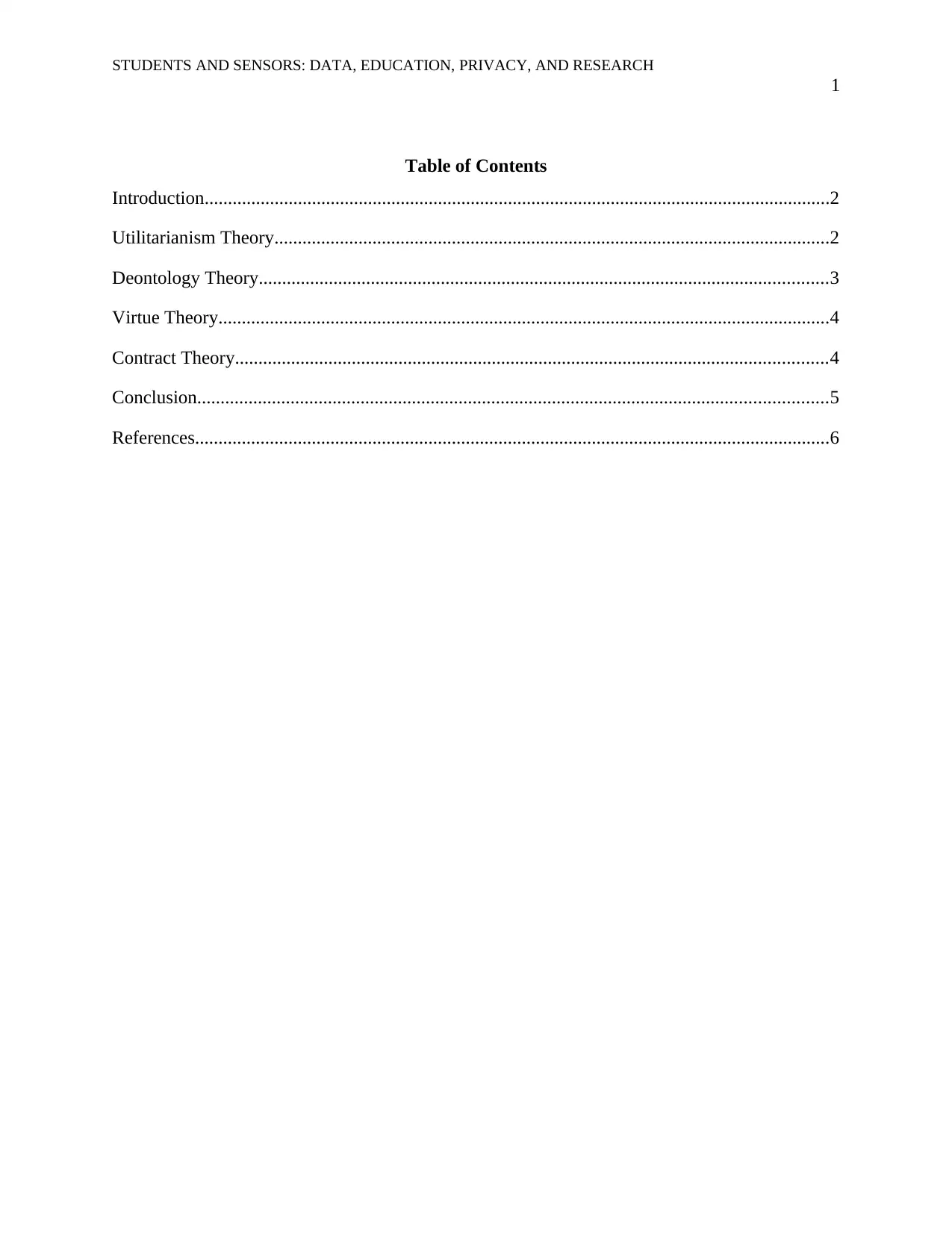
STUDENTS AND SENSORS: DATA, EDUCATION, PRIVACY, AND RESEARCH
1
Table of Contents
Introduction......................................................................................................................................2
Utilitarianism Theory.......................................................................................................................2
Deontology Theory..........................................................................................................................3
Virtue Theory...................................................................................................................................4
Contract Theory...............................................................................................................................4
Conclusion.......................................................................................................................................5
References........................................................................................................................................6
1
Table of Contents
Introduction......................................................................................................................................2
Utilitarianism Theory.......................................................................................................................2
Deontology Theory..........................................................................................................................3
Virtue Theory...................................................................................................................................4
Contract Theory...............................................................................................................................4
Conclusion.......................................................................................................................................5
References........................................................................................................................................6
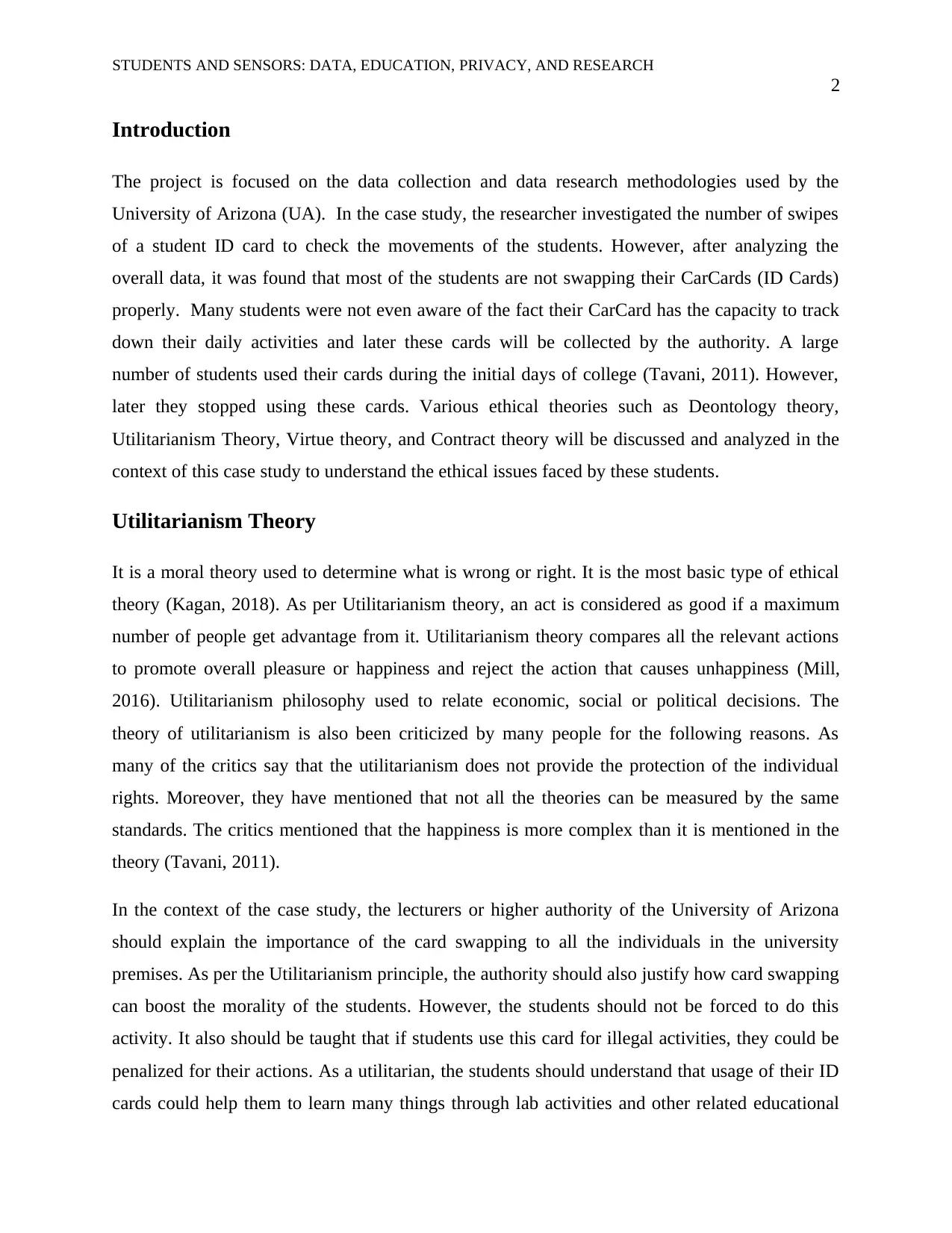
STUDENTS AND SENSORS: DATA, EDUCATION, PRIVACY, AND RESEARCH
2
Introduction
The project is focused on the data collection and data research methodologies used by the
University of Arizona (UA). In the case study, the researcher investigated the number of swipes
of a student ID card to check the movements of the students. However, after analyzing the
overall data, it was found that most of the students are not swapping their CarCards (ID Cards)
properly. Many students were not even aware of the fact their CarCard has the capacity to track
down their daily activities and later these cards will be collected by the authority. A large
number of students used their cards during the initial days of college (Tavani, 2011). However,
later they stopped using these cards. Various ethical theories such as Deontology theory,
Utilitarianism Theory, Virtue theory, and Contract theory will be discussed and analyzed in the
context of this case study to understand the ethical issues faced by these students.
Utilitarianism Theory
It is a moral theory used to determine what is wrong or right. It is the most basic type of ethical
theory (Kagan, 2018). As per Utilitarianism theory, an act is considered as good if a maximum
number of people get advantage from it. Utilitarianism theory compares all the relevant actions
to promote overall pleasure or happiness and reject the action that causes unhappiness (Mill,
2016). Utilitarianism philosophy used to relate economic, social or political decisions. The
theory of utilitarianism is also been criticized by many people for the following reasons. As
many of the critics say that the utilitarianism does not provide the protection of the individual
rights. Moreover, they have mentioned that not all the theories can be measured by the same
standards. The critics mentioned that the happiness is more complex than it is mentioned in the
theory (Tavani, 2011).
In the context of the case study, the lecturers or higher authority of the University of Arizona
should explain the importance of the card swapping to all the individuals in the university
premises. As per the Utilitarianism principle, the authority should also justify how card swapping
can boost the morality of the students. However, the students should not be forced to do this
activity. It also should be taught that if students use this card for illegal activities, they could be
penalized for their actions. As a utilitarian, the students should understand that usage of their ID
cards could help them to learn many things through lab activities and other related educational
2
Introduction
The project is focused on the data collection and data research methodologies used by the
University of Arizona (UA). In the case study, the researcher investigated the number of swipes
of a student ID card to check the movements of the students. However, after analyzing the
overall data, it was found that most of the students are not swapping their CarCards (ID Cards)
properly. Many students were not even aware of the fact their CarCard has the capacity to track
down their daily activities and later these cards will be collected by the authority. A large
number of students used their cards during the initial days of college (Tavani, 2011). However,
later they stopped using these cards. Various ethical theories such as Deontology theory,
Utilitarianism Theory, Virtue theory, and Contract theory will be discussed and analyzed in the
context of this case study to understand the ethical issues faced by these students.
Utilitarianism Theory
It is a moral theory used to determine what is wrong or right. It is the most basic type of ethical
theory (Kagan, 2018). As per Utilitarianism theory, an act is considered as good if a maximum
number of people get advantage from it. Utilitarianism theory compares all the relevant actions
to promote overall pleasure or happiness and reject the action that causes unhappiness (Mill,
2016). Utilitarianism philosophy used to relate economic, social or political decisions. The
theory of utilitarianism is also been criticized by many people for the following reasons. As
many of the critics say that the utilitarianism does not provide the protection of the individual
rights. Moreover, they have mentioned that not all the theories can be measured by the same
standards. The critics mentioned that the happiness is more complex than it is mentioned in the
theory (Tavani, 2011).
In the context of the case study, the lecturers or higher authority of the University of Arizona
should explain the importance of the card swapping to all the individuals in the university
premises. As per the Utilitarianism principle, the authority should also justify how card swapping
can boost the morality of the students. However, the students should not be forced to do this
activity. It also should be taught that if students use this card for illegal activities, they could be
penalized for their actions. As a utilitarian, the students should understand that usage of their ID
cards could help them to learn many things through lab activities and other related educational
⊘ This is a preview!⊘
Do you want full access?
Subscribe today to unlock all pages.

Trusted by 1+ million students worldwide
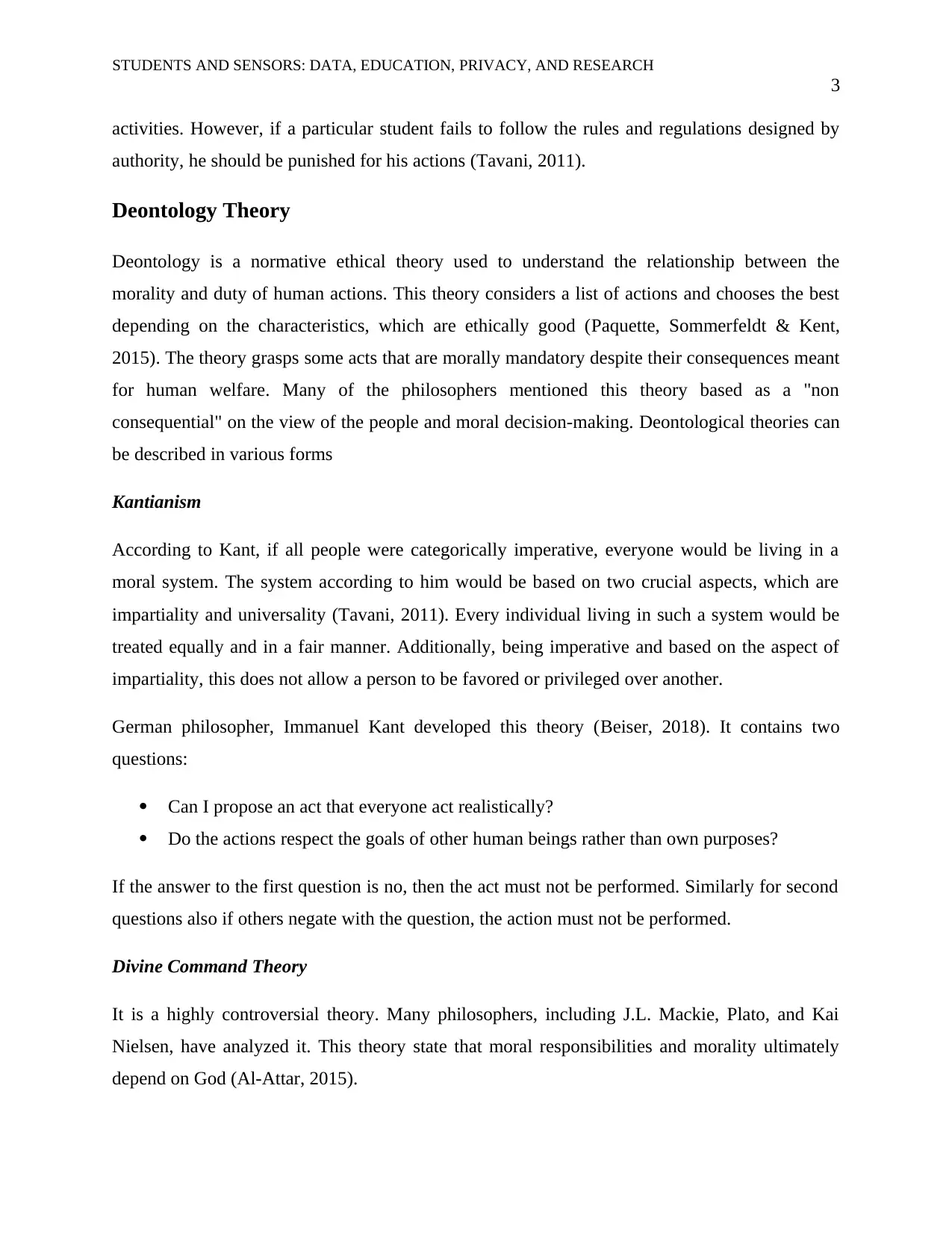
STUDENTS AND SENSORS: DATA, EDUCATION, PRIVACY, AND RESEARCH
3
activities. However, if a particular student fails to follow the rules and regulations designed by
authority, he should be punished for his actions (Tavani, 2011).
Deontology Theory
Deontology is a normative ethical theory used to understand the relationship between the
morality and duty of human actions. This theory considers a list of actions and chooses the best
depending on the characteristics, which are ethically good (Paquette, Sommerfeldt & Kent,
2015). The theory grasps some acts that are morally mandatory despite their consequences meant
for human welfare. Many of the philosophers mentioned this theory based as a "non
consequential" on the view of the people and moral decision-making. Deontological theories can
be described in various forms
Kantianism
According to Kant, if all people were categorically imperative, everyone would be living in a
moral system. The system according to him would be based on two crucial aspects, which are
impartiality and universality (Tavani, 2011). Every individual living in such a system would be
treated equally and in a fair manner. Additionally, being imperative and based on the aspect of
impartiality, this does not allow a person to be favored or privileged over another.
German philosopher, Immanuel Kant developed this theory (Beiser, 2018). It contains two
questions:
Can I propose an act that everyone act realistically?
Do the actions respect the goals of other human beings rather than own purposes?
If the answer to the first question is no, then the act must not be performed. Similarly for second
questions also if others negate with the question, the action must not be performed.
Divine Command Theory
It is a highly controversial theory. Many philosophers, including J.L. Mackie, Plato, and Kai
Nielsen, have analyzed it. This theory state that moral responsibilities and morality ultimately
depend on God (Al-Attar, 2015).
3
activities. However, if a particular student fails to follow the rules and regulations designed by
authority, he should be punished for his actions (Tavani, 2011).
Deontology Theory
Deontology is a normative ethical theory used to understand the relationship between the
morality and duty of human actions. This theory considers a list of actions and chooses the best
depending on the characteristics, which are ethically good (Paquette, Sommerfeldt & Kent,
2015). The theory grasps some acts that are morally mandatory despite their consequences meant
for human welfare. Many of the philosophers mentioned this theory based as a "non
consequential" on the view of the people and moral decision-making. Deontological theories can
be described in various forms
Kantianism
According to Kant, if all people were categorically imperative, everyone would be living in a
moral system. The system according to him would be based on two crucial aspects, which are
impartiality and universality (Tavani, 2011). Every individual living in such a system would be
treated equally and in a fair manner. Additionally, being imperative and based on the aspect of
impartiality, this does not allow a person to be favored or privileged over another.
German philosopher, Immanuel Kant developed this theory (Beiser, 2018). It contains two
questions:
Can I propose an act that everyone act realistically?
Do the actions respect the goals of other human beings rather than own purposes?
If the answer to the first question is no, then the act must not be performed. Similarly for second
questions also if others negate with the question, the action must not be performed.
Divine Command Theory
It is a highly controversial theory. Many philosophers, including J.L. Mackie, Plato, and Kai
Nielsen, have analyzed it. This theory state that moral responsibilities and morality ultimately
depend on God (Al-Attar, 2015).
Paraphrase This Document
Need a fresh take? Get an instant paraphrase of this document with our AI Paraphraser
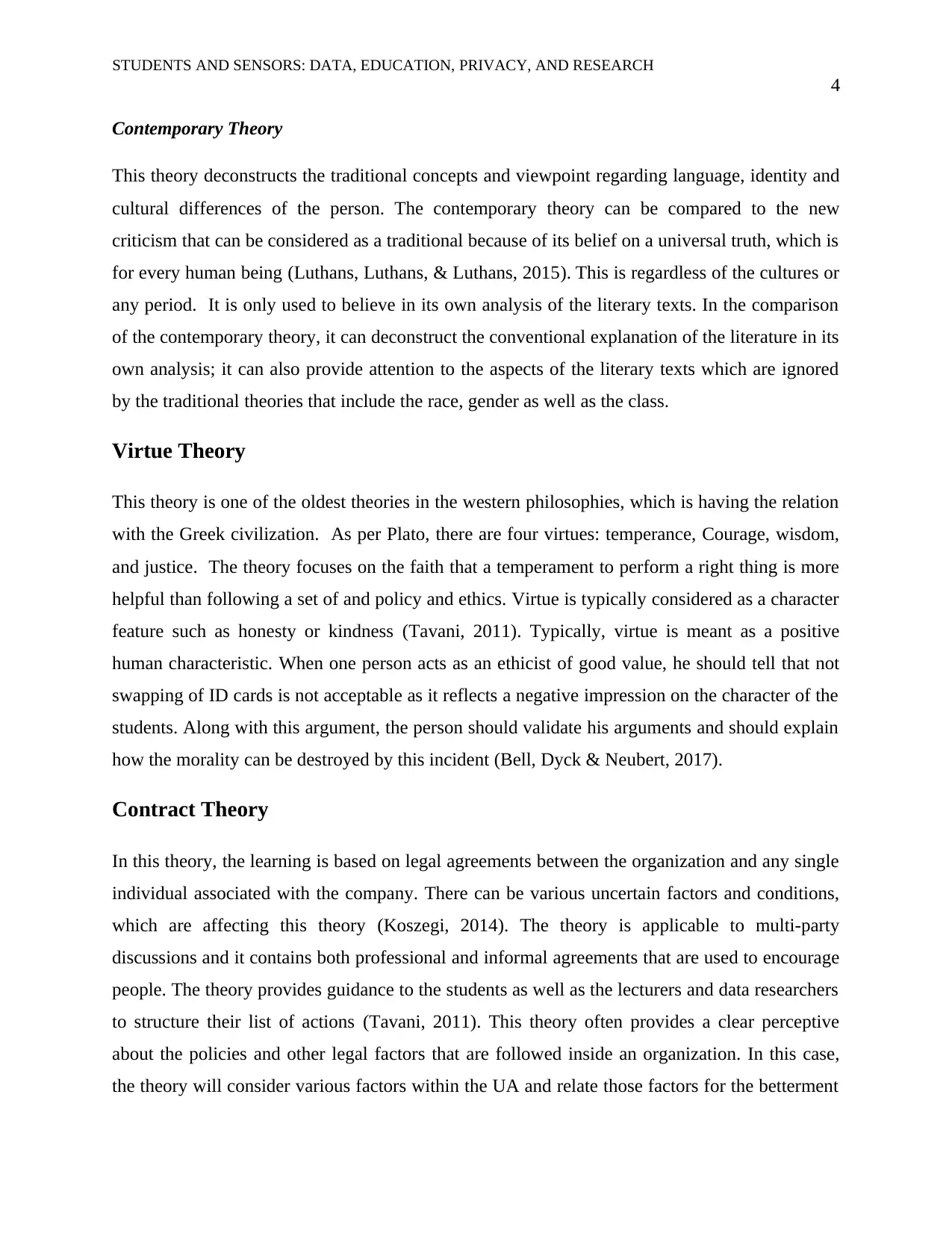
STUDENTS AND SENSORS: DATA, EDUCATION, PRIVACY, AND RESEARCH
4
Contemporary Theory
This theory deconstructs the traditional concepts and viewpoint regarding language, identity and
cultural differences of the person. The contemporary theory can be compared to the new
criticism that can be considered as a traditional because of its belief on a universal truth, which is
for every human being (Luthans, Luthans, & Luthans, 2015). This is regardless of the cultures or
any period. It is only used to believe in its own analysis of the literary texts. In the comparison
of the contemporary theory, it can deconstruct the conventional explanation of the literature in its
own analysis; it can also provide attention to the aspects of the literary texts which are ignored
by the traditional theories that include the race, gender as well as the class.
Virtue Theory
This theory is one of the oldest theories in the western philosophies, which is having the relation
with the Greek civilization. As per Plato, there are four virtues: temperance, Courage, wisdom,
and justice. The theory focuses on the faith that a temperament to perform a right thing is more
helpful than following a set of and policy and ethics. Virtue is typically considered as a character
feature such as honesty or kindness (Tavani, 2011). Typically, virtue is meant as a positive
human characteristic. When one person acts as an ethicist of good value, he should tell that not
swapping of ID cards is not acceptable as it reflects a negative impression on the character of the
students. Along with this argument, the person should validate his arguments and should explain
how the morality can be destroyed by this incident (Bell, Dyck & Neubert, 2017).
Contract Theory
In this theory, the learning is based on legal agreements between the organization and any single
individual associated with the company. There can be various uncertain factors and conditions,
which are affecting this theory (Koszegi, 2014). The theory is applicable to multi-party
discussions and it contains both professional and informal agreements that are used to encourage
people. The theory provides guidance to the students as well as the lecturers and data researchers
to structure their list of actions (Tavani, 2011). This theory often provides a clear perceptive
about the policies and other legal factors that are followed inside an organization. In this case,
the theory will consider various factors within the UA and relate those factors for the betterment
4
Contemporary Theory
This theory deconstructs the traditional concepts and viewpoint regarding language, identity and
cultural differences of the person. The contemporary theory can be compared to the new
criticism that can be considered as a traditional because of its belief on a universal truth, which is
for every human being (Luthans, Luthans, & Luthans, 2015). This is regardless of the cultures or
any period. It is only used to believe in its own analysis of the literary texts. In the comparison
of the contemporary theory, it can deconstruct the conventional explanation of the literature in its
own analysis; it can also provide attention to the aspects of the literary texts which are ignored
by the traditional theories that include the race, gender as well as the class.
Virtue Theory
This theory is one of the oldest theories in the western philosophies, which is having the relation
with the Greek civilization. As per Plato, there are four virtues: temperance, Courage, wisdom,
and justice. The theory focuses on the faith that a temperament to perform a right thing is more
helpful than following a set of and policy and ethics. Virtue is typically considered as a character
feature such as honesty or kindness (Tavani, 2011). Typically, virtue is meant as a positive
human characteristic. When one person acts as an ethicist of good value, he should tell that not
swapping of ID cards is not acceptable as it reflects a negative impression on the character of the
students. Along with this argument, the person should validate his arguments and should explain
how the morality can be destroyed by this incident (Bell, Dyck & Neubert, 2017).
Contract Theory
In this theory, the learning is based on legal agreements between the organization and any single
individual associated with the company. There can be various uncertain factors and conditions,
which are affecting this theory (Koszegi, 2014). The theory is applicable to multi-party
discussions and it contains both professional and informal agreements that are used to encourage
people. The theory provides guidance to the students as well as the lecturers and data researchers
to structure their list of actions (Tavani, 2011). This theory often provides a clear perceptive
about the policies and other legal factors that are followed inside an organization. In this case,
the theory will consider various factors within the UA and relate those factors for the betterment
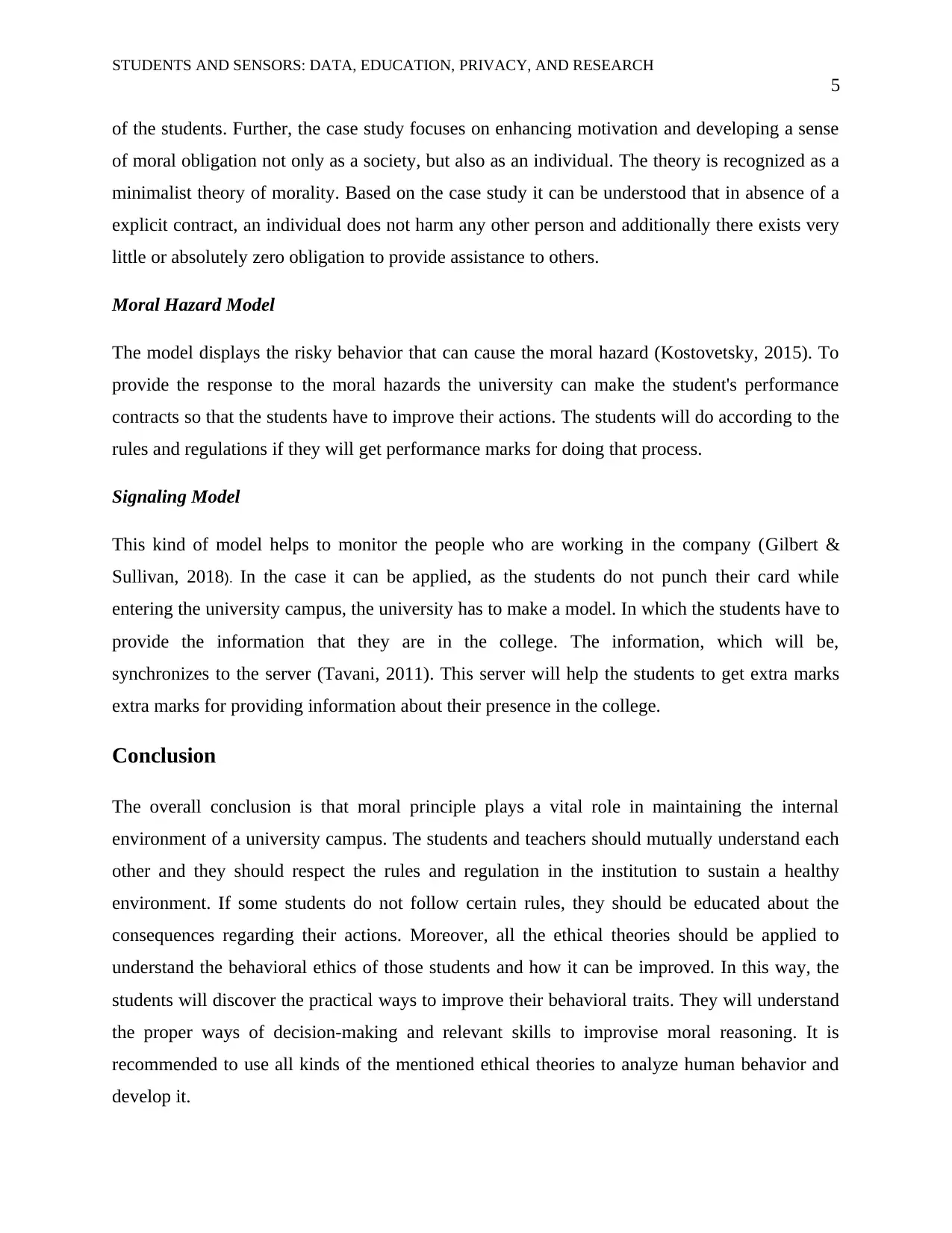
STUDENTS AND SENSORS: DATA, EDUCATION, PRIVACY, AND RESEARCH
5
of the students. Further, the case study focuses on enhancing motivation and developing a sense
of moral obligation not only as a society, but also as an individual. The theory is recognized as a
minimalist theory of morality. Based on the case study it can be understood that in absence of a
explicit contract, an individual does not harm any other person and additionally there exists very
little or absolutely zero obligation to provide assistance to others.
Moral Hazard Model
The model displays the risky behavior that can cause the moral hazard (Kostovetsky, 2015). To
provide the response to the moral hazards the university can make the student's performance
contracts so that the students have to improve their actions. The students will do according to the
rules and regulations if they will get performance marks for doing that process.
Signaling Model
This kind of model helps to monitor the people who are working in the company (Gilbert &
Sullivan, 2018). In the case it can be applied, as the students do not punch their card while
entering the university campus, the university has to make a model. In which the students have to
provide the information that they are in the college. The information, which will be,
synchronizes to the server (Tavani, 2011). This server will help the students to get extra marks
extra marks for providing information about their presence in the college.
Conclusion
The overall conclusion is that moral principle plays a vital role in maintaining the internal
environment of a university campus. The students and teachers should mutually understand each
other and they should respect the rules and regulation in the institution to sustain a healthy
environment. If some students do not follow certain rules, they should be educated about the
consequences regarding their actions. Moreover, all the ethical theories should be applied to
understand the behavioral ethics of those students and how it can be improved. In this way, the
students will discover the practical ways to improve their behavioral traits. They will understand
the proper ways of decision-making and relevant skills to improvise moral reasoning. It is
recommended to use all kinds of the mentioned ethical theories to analyze human behavior and
develop it.
5
of the students. Further, the case study focuses on enhancing motivation and developing a sense
of moral obligation not only as a society, but also as an individual. The theory is recognized as a
minimalist theory of morality. Based on the case study it can be understood that in absence of a
explicit contract, an individual does not harm any other person and additionally there exists very
little or absolutely zero obligation to provide assistance to others.
Moral Hazard Model
The model displays the risky behavior that can cause the moral hazard (Kostovetsky, 2015). To
provide the response to the moral hazards the university can make the student's performance
contracts so that the students have to improve their actions. The students will do according to the
rules and regulations if they will get performance marks for doing that process.
Signaling Model
This kind of model helps to monitor the people who are working in the company (Gilbert &
Sullivan, 2018). In the case it can be applied, as the students do not punch their card while
entering the university campus, the university has to make a model. In which the students have to
provide the information that they are in the college. The information, which will be,
synchronizes to the server (Tavani, 2011). This server will help the students to get extra marks
extra marks for providing information about their presence in the college.
Conclusion
The overall conclusion is that moral principle plays a vital role in maintaining the internal
environment of a university campus. The students and teachers should mutually understand each
other and they should respect the rules and regulation in the institution to sustain a healthy
environment. If some students do not follow certain rules, they should be educated about the
consequences regarding their actions. Moreover, all the ethical theories should be applied to
understand the behavioral ethics of those students and how it can be improved. In this way, the
students will discover the practical ways to improve their behavioral traits. They will understand
the proper ways of decision-making and relevant skills to improvise moral reasoning. It is
recommended to use all kinds of the mentioned ethical theories to analyze human behavior and
develop it.
⊘ This is a preview!⊘
Do you want full access?
Subscribe today to unlock all pages.

Trusted by 1+ million students worldwide

STUDENTS AND SENSORS: DATA, EDUCATION, PRIVACY, AND RESEARCH
6
6
Paraphrase This Document
Need a fresh take? Get an instant paraphrase of this document with our AI Paraphraser
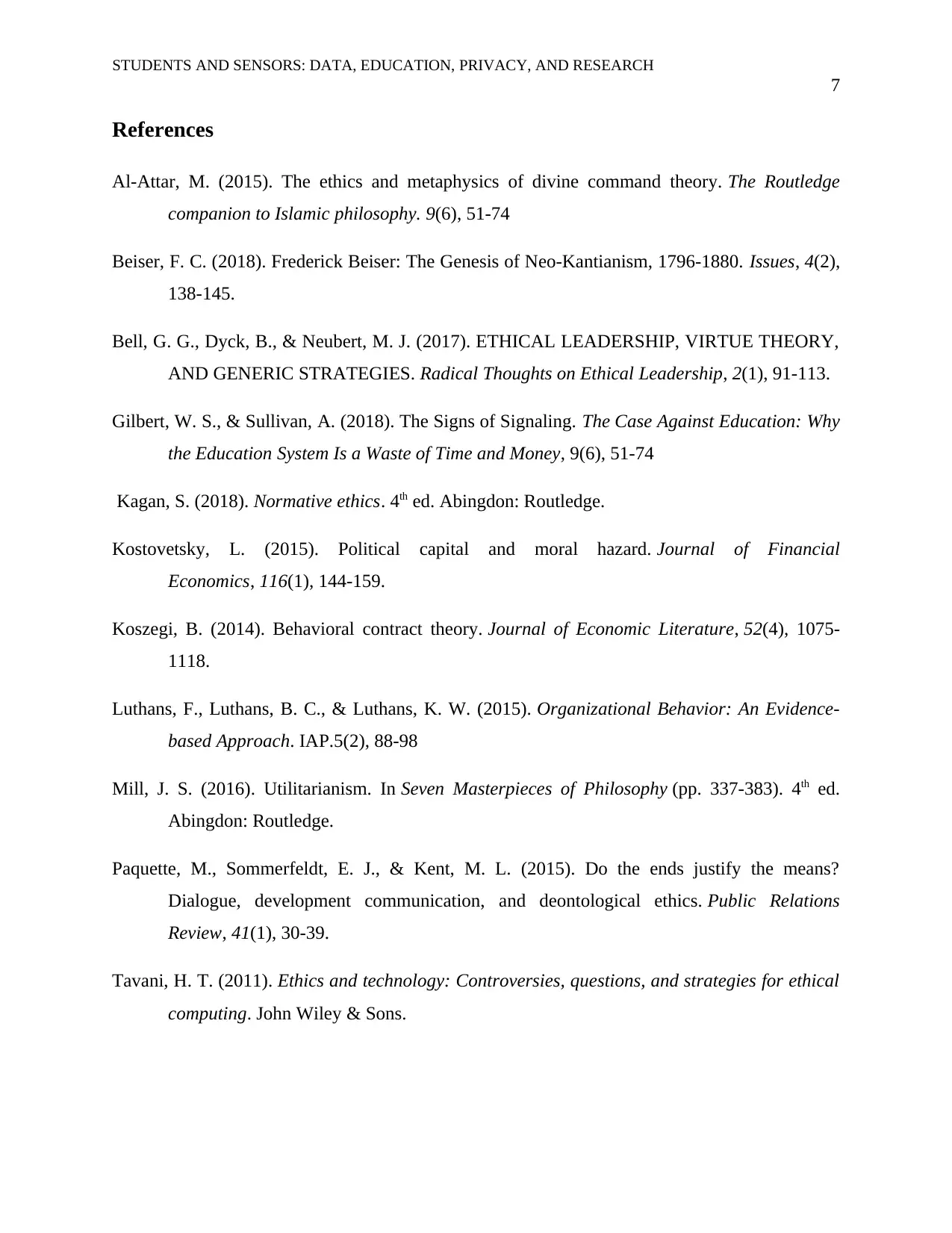
STUDENTS AND SENSORS: DATA, EDUCATION, PRIVACY, AND RESEARCH
7
References
Al-Attar, M. (2015). The ethics and metaphysics of divine command theory. The Routledge
companion to Islamic philosophy. 9(6), 51-74
Beiser, F. C. (2018). Frederick Beiser: The Genesis of Neo-Kantianism, 1796-1880. Issues, 4(2),
138-145.
Bell, G. G., Dyck, B., & Neubert, M. J. (2017). ETHICAL LEADERSHIP, VIRTUE THEORY,
AND GENERIC STRATEGIES. Radical Thoughts on Ethical Leadership, 2(1), 91-113.
Gilbert, W. S., & Sullivan, A. (2018). The Signs of Signaling. The Case Against Education: Why
the Education System Is a Waste of Time and Money, 9(6), 51-74
Kagan, S. (2018). Normative ethics. 4th ed. Abingdon: Routledge.
Kostovetsky, L. (2015). Political capital and moral hazard. Journal of Financial
Economics, 116(1), 144-159.
Koszegi, B. (2014). Behavioral contract theory. Journal of Economic Literature, 52(4), 1075-
1118.
Luthans, F., Luthans, B. C., & Luthans, K. W. (2015). Organizational Behavior: An Evidence-
based Approach. IAP.5(2), 88-98
Mill, J. S. (2016). Utilitarianism. In Seven Masterpieces of Philosophy (pp. 337-383). 4th ed.
Abingdon: Routledge.
Paquette, M., Sommerfeldt, E. J., & Kent, M. L. (2015). Do the ends justify the means?
Dialogue, development communication, and deontological ethics. Public Relations
Review, 41(1), 30-39.
Tavani, H. T. (2011). Ethics and technology: Controversies, questions, and strategies for ethical
computing. John Wiley & Sons.
7
References
Al-Attar, M. (2015). The ethics and metaphysics of divine command theory. The Routledge
companion to Islamic philosophy. 9(6), 51-74
Beiser, F. C. (2018). Frederick Beiser: The Genesis of Neo-Kantianism, 1796-1880. Issues, 4(2),
138-145.
Bell, G. G., Dyck, B., & Neubert, M. J. (2017). ETHICAL LEADERSHIP, VIRTUE THEORY,
AND GENERIC STRATEGIES. Radical Thoughts on Ethical Leadership, 2(1), 91-113.
Gilbert, W. S., & Sullivan, A. (2018). The Signs of Signaling. The Case Against Education: Why
the Education System Is a Waste of Time and Money, 9(6), 51-74
Kagan, S. (2018). Normative ethics. 4th ed. Abingdon: Routledge.
Kostovetsky, L. (2015). Political capital and moral hazard. Journal of Financial
Economics, 116(1), 144-159.
Koszegi, B. (2014). Behavioral contract theory. Journal of Economic Literature, 52(4), 1075-
1118.
Luthans, F., Luthans, B. C., & Luthans, K. W. (2015). Organizational Behavior: An Evidence-
based Approach. IAP.5(2), 88-98
Mill, J. S. (2016). Utilitarianism. In Seven Masterpieces of Philosophy (pp. 337-383). 4th ed.
Abingdon: Routledge.
Paquette, M., Sommerfeldt, E. J., & Kent, M. L. (2015). Do the ends justify the means?
Dialogue, development communication, and deontological ethics. Public Relations
Review, 41(1), 30-39.
Tavani, H. T. (2011). Ethics and technology: Controversies, questions, and strategies for ethical
computing. John Wiley & Sons.
1 out of 8
Related Documents
Your All-in-One AI-Powered Toolkit for Academic Success.
+13062052269
info@desklib.com
Available 24*7 on WhatsApp / Email
![[object Object]](/_next/static/media/star-bottom.7253800d.svg)
Unlock your academic potential
Copyright © 2020–2026 A2Z Services. All Rights Reserved. Developed and managed by ZUCOL.


